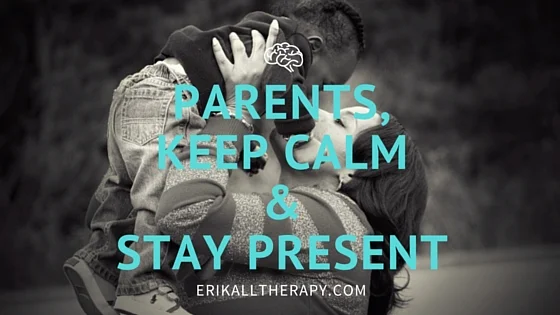Parents, Keep Calm & Stay Present
Put yourself in this scenario. You are trying to run errands and have your toddler with you. You are moving through the aisles and checking off items from your list. All of a sudden, your child has laser focus vision, and sees that box of cookies across the way. You make it through that disaster by using redirection and focusing their attention on something else. You’re able to avoid the various other minefields of the grocery store, and you’re making your way to the finish line. But, as you check out, just within reach…boxes of candy bars.
And that’s what does it. You tell him/her no, and here come the tears, the whining, and the full blown tantrum. You feel like everyone is staring at you. The lady behind you is drilling a hole in the back of your head with her judgy eyes. No matter how you choose to discipline your child, someone will have something to say. You feel like you’re doing it all wrong. Deep down, you wonder if you are a failure as a parent.
You’ve probably heard of the idea of self care, where you put effort into caring for yourself in order to take better care of others. Self care is not just necessary, it’s essential! However, one of my biggest concerns with self care is that it does little in moments of crisis. In the situation described above, I doubt anyone would say to themselves “well, this is unfortunate, but it’s ok because I got that manicure last week.” As a parent, you need strategies for how to move forward and deal with stressful situations in the moment.
In this post, I will focus on ideas from Dr. Kristin Neff’s work, self-compassion. As parents, we judge ourselves and base much of our perception of our successes and failures on what other people say. We experience grief and shame about how we parent and the mistakes we have made. Self-compassion offers us strategies for relating to ourselves kindly, embracing who we are (flaws and all), and accepting our feelings for what they are instead of judging them. This is a skill that takes a lot of practice. There are three components of self-compassion:
Treating ourselves with kindness: When we feel like we have failed at something, we are super hard on ourselves. You would never talk to your friends the way you talk to yourself. Practice talking to yourself in a supportive way, with encouragement, sympathy, patience, and gentleness. For example, when you are feeling frustrated it’s easy to lash out at your partner or snap at your child. Even if you apologize, you still feel guilty. Beating yourself up about it won’t help either of you. It actually just takes you out of the present and focusing on being mean to yourself. Try showing yourself understanding and compassion about being a parent, because sometimes it’s really freaking hard. Being gentle on yourself instead of focusing on a mistake that’s already been made will allow that moment to be accepted, pass more quickly, and bring you back into the present and engaged with your partner or child.
Recognizing our common humanity: When you make a mistake or things don’t fall into place, you probably view it as abnormal or that something is wrong with you. You compare yourself to the perfect mom down the street that is always on time and makes all organic meals. In essence, you isolate yourself and your experience by thinking you are the only one that can’t get it together. It’s actually our imperfections and flaws that connect us to others. That other mom has moments of struggle too. Recognizing that can help you feel connected, understood, and human.
Being mindful: In order to show ourselves compassion, we need to first acknowledge that we’re experiencing something difficult. Pay attention to how you treat yourself in challenging moments, which will send a cue to you that you need to show yourself some kindness. How often do you escalate situations in your mind or increase your stress level by criticizing yourself? Our self-attacks are counter-productive and really serve no one. When you find that you are experiencing harsh emotions, take note of that. Don’t judge it, simply acknowledge that it’s happening and that you can shift gears in that moment and take another approach.
So next time your toddler has a tantrum in the grocery store and you start to get down on yourself, engage in self-compassion techniques. Acknowledge how out of control you feel, how hard it is to parent in this moment, how challenging toddlers can be. It sounds corny, but this stuff works. Tell yourself “I know how hard this moment is, and I’m sorry you’re going through it.” Our brains are primed to respond to warmth and gentle touch, so you can actually rub your arm or pat your chest softly. This allows your whole body to calm down and your brain to function more efficiently. You can make better decisions moving forward in stressful situations. Will these techniques stop your toddler from throwing a tantrum? No. But they will help you get through it feeling better and more confident as a parent.
How will you show yourself compassion today?
This is one of the techniques I will be exploring in an upcoming parenting workshop: Keep Calm & Parent with Purpose. Together my colleague Melanie Graves, LMFT, and I have created a fun, interactive, practical workshop for gaining insight into your own parenting style and will leave you walking away with new skills to discipline and communicate about parenting. We have some awesome things planned, including some great giveaways! You don’t want to miss it. Learn more about it here or call me at (832) 827-3288 with questions.
STAY CONNECTED WITH ME ON SOCIAL MEDIA

